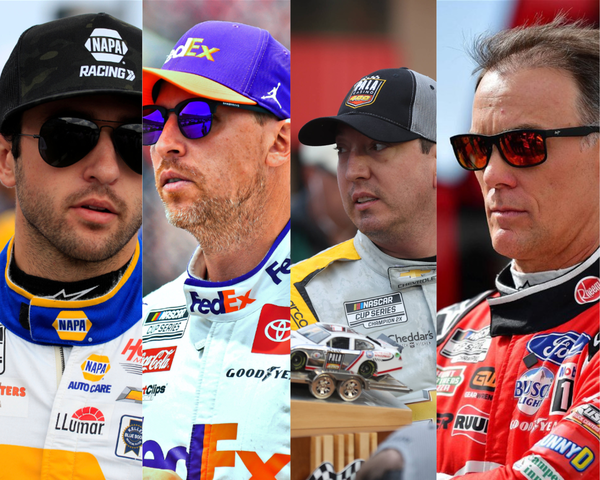
via Imago
Credits: Imago

via Imago
Credits: Imago
Data-driven decision-making has become an integral part of all motorsports, including NASCAR. The use of advanced analytics and technology has transformed the way teams strategize and make crucial race-day decisions. However, recent events involving Denny Hamlin, Chase Elliott, and a controversial crash have brought the topic of data analysis to the forefront of discussions among drivers. Two of the most prominent drivers on the Cup Series roster, Kyle Busch and Kevin Harvick have recently spoken out about the importance of using data and the implications it can have on penalty decisions.
The controversy surrounding Chase Elliott‘s suspension began when Hamlin posted simulated data on social media, claiming it removed all doubt that the wreck was intentional. Hamlin criticized Elliott’s actions, arguing that the data clearly showed deliberate payback for prior contact between the two drivers. He also highlighted the dangerous nature of right rear hooks and questioned Elliott’s eligibility to race the following week.
Kyle Busch weighs in on the data debate following Hamlin–Elliott feud
ADVERTISEMENT
Article continues below this ad
When asked about the significance of data-driven decision-making, Busch recalled a personal experience from 2017 involving Joey Logano. He said, “Yeah, I mean I brought data up when Joey Logano wrecked me in 2017 and they didn’t give two shits so you know it’s just a matter of I guess enough drivers who have done that so they’re probably like let’s look at this and figure it out so you know I think that’s fine, it’s good.” Busch emphasized the need for consistency in applying penalties based on data analysis as he referred to their Las Vegas Altercation.
Regarding the suspension of a driver who rear-hooked someone, Busch expressed his support, stating, “Yeah, I would say so. I’ve been in that situation before, and actually, my penalty was double, mine was two, so you know I always set the standard up.” Busch’s remarks highlight the importance of appropriate penalties that align with the severity of the incident.
Kyle Busch said he tried to bring up data to NASCAR when Joey Logano wrecked him in 2017 so he likes they are looking at it now in determining penalties. Also: Busch on what a driver learns when sitting out for retaliation. pic.twitter.com/91K0ElgboV
— Bob Pockrass (@bobpockrass) June 4, 2023
WATCH THIS STORY: Bubba Wallace Insider Tears Apart Chase Elliott retaliation with HMS’s Stars unfamiliar Example
Kevin Harvick joins forces with Busch on the data debate
Trending
Kevin Harvick weighed in on the topic, emphasizing the need to use available data to make informed decisions. During an interaction with the media, he said, “Well, I think they learned at Bristol that they needed to use the data.
“And I think since Bristol and understanding everything that happened there, not understanding the data at that particular point or saying that they did not understand the data at that particular point, you know, I think since then they’ve done a good job of trying to use the data because it’s there.
Harvick’s comments highlight the pivotal role that data plays in ensuring fair and informed decision-making. He acknowledged the lessons learned from previous incidents and stressed the importance of utilizing available data to make sound judgments, adding, “You know it’s a free opinion to look at. So, I think you have to use the data, you have to understand the data, and I think to make a great decision, you have to be able to do that.”
Kevin Harvick indicated it is better for NASCAR to use data to help determine penalties as he felt it wasn’t used a couple of years ago when he and Chase Elliott tangled at Bristol. Harvick also said a one-race suspension was appropriate for right-rear-hooking another driver. pic.twitter.com/eqS6Bijfo3
— Bob Pockrass (@bobpockrass) June 3, 2023
ADVERTISEMENT
Article continues below this ad
The use of data in NASCAR has become increasingly important in determining the outcomes of incidents on the track. NASCAR’s decision to suspend Elliott was based on a thorough review of available resources, including data analysis. Elton Sawyer, NASCAR’s senior vice president of competition, affirmed that the crash was an intentional act by Elliott.
In the fast-paced world of NASCAR, where split-second decisions can have far-reaching consequences, embracing data-driven decision-making becomes crucial for maintaining fairness and consistency. The insights provided by data can help ensure that penalties and suspensions are warranted and that the sport remains competitive and safe for all drivers involved.
ADVERTISEMENT
Article continues below this ad
ADVERTISEMENT
ADVERTISEMENT
ADVERTISEMENT







